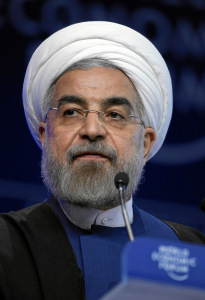Hassan Rouhani: Supreme Leader Khamenei’s Choice for President?
The Supreme Leader is increasingly sensitive to global perceptions and direly wants these elections to look as legitimate as possible by having a high voter turnout, so as to reinforce what is promoted as Iranian democracy.
[commentary] Of course, nobody knows except for Supreme Leader Ali Khamenei himself, but what if he did implicitly support Hassan Rouhani, the lone moderate candidate in Iran’s presidential race, would it be a complete surprise? Perhaps not, it might actually make sense.
Unlike some reformist leaders who have been isolated or pushed out of power since the 2009 presidential election, such as Mir Hossein Mousavi and Mehdi Karoubi who are under house arrest, and such as former presidents, Mohammad Khatami and Ali Akbar Hashemi Rafsanjani, the latter of which was recently barred from pursuing the presidency, Rouhani maintains good relations with the Supreme Leader. After all, Rouhani, the only cleric in the presidential race, has been an active pillar of the Islamic Republic for decades, having been a former Speaker of the Majles (Iranian parliament), member of the Expediency Council since 1991, head of the Center for Strategic Research since 1992, member of the Assembly of Experts since 1999 and Secretary of the Supreme National Security Council between 1989 and 2005. As Secretary, he was lead nuclear negotiator for Iran between 2003 and 2005 during which Iran had agreed to suspend its nuclear enrichment activities with the EU-3 (France, Germany and the United Kingdom). Rouhani could not have lasted as long as he has as a key figure in the Islamic Republic without the Supreme Leader’s approval.
A possible implicit support for Rouhani by the Supreme Leader is further compounded when considering the turmoil which occurred in Tehran four years ago in the aftermath of President Ahmadinejad’s contested re-election. The Supreme Leader is increasingly sensitive to global perceptions and direly wants these elections to look as legitimate as possible by having a high voter turnout, so as to reinforce what is promoted as Iranian democracy. Time and again it has been said that a large turnout would “disappoint the enemy”. The Supreme Leader has even said that people who do not support the Islamic Republic should vote “to support their country”. Through this outlook, the Supreme Leader wouldn’t mind showing the world that ordinary Iranians have a real choice and that the outcome isn’t predetermined.
Furthermore, should Rouhani win the election, Iran’s international rhetoric would likely sway away from the inflammatory posture the world has been accustomed to witnessing over the past several years, and his experience as a former successful nuclear negotiator may pay dividends in the standoff with the United States. Though Iran’s foreign and nuclear policy is controlled by the Supreme Leader, having a compliant, eloquent and diplomatic president could only help resolve Iran’s differences with the United States, potentially leading to a peaceful resolution of the nuclear impasse as well as sanctions relief. It is also possible that it would make pro-democracy activists and the Green Movement increasingly docile as Rouhani has already spoken the language of reform, promising to free political prisoners and safeguarding civil rights. Moreover, the Supreme Leader might be pleased with Rouhani’s increasing popularity which stems in large part due to his moderate and pragmatist background, and thanks to endorsements from Khatami and Rafsanjani. Rouhani’s ability to pull in large crowds at rallies legitimizes his candidacy, the presidency, and by association, the Islamic Republic. Finally, having the Supreme Leader support a reformist candidate, albeit implicitly, is not that difficult to believe when considering that another Khamenei, Hadi Khamenei, the Supreme Leader’s younger brother, called on Iran’s people to “prevent the country from falling into the trap of radicalism” by casting their ballots for Rouhani, effectively endorsing the reformist candidate.
Supreme Leader Ali Khamenei has governed over two previous reformist/moderate presidents, Rafsanjani and Khatami, respectively, and may welcome governing over a third, particularly when taking the above into account.
The opinions here represent the author’s own.
Related posts:
Category: FOREIGN POLICY & SECURITY, MIDDLE EAST & NORTH AFRICA


